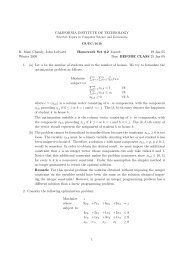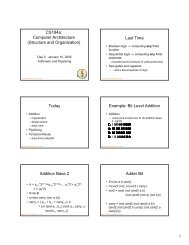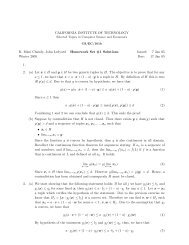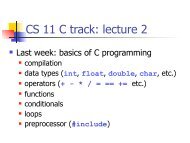- Page 1: The Objective Caml system release 3
- Page 4 and 5: 2 3.16 Friends . . . . . . . . . .
- Page 6 and 7: 4 16 The debugger (ocamldebug) 203
- Page 8 and 9: 6 25 The graphics library 411 25.1
- Page 10 and 11: 8 Foreword The present documentatio
- Page 13 and 14: Chapter 1 The core language This pa
- Page 15 and 16: Chapter 1. The core language 13 # ;
- Page 17 and 18: Chapter 1. The core language 15 # l
- Page 19 and 20: Chapter 1. The core language 17 # a
- Page 21 and 22: Chapter 1. The core language 19 # l
- Page 23 and 24: Chapter 1. The core language 21 # |
- Page 25 and 26: Chapter 1. The core language 23 va
- Page 27 and 28: Chapter 2 The module system This ch
- Page 29 and 30: Chapter 2. The module system 27 val
- Page 31: Chapter 2. The module system 29 end
- Page 35 and 36: Chapter 3 Objects in Caml (Chapter
- Page 37 and 38: Chapter 3. Objects in Caml 35 The p
- Page 39 and 40: Chapter 3. Objects in Caml 37 # met
- Page 41 and 42: Chapter 3. Objects in Caml 39 # end
- Page 43 and 44: Chapter 3. Objects in Caml 41 3.7 I
- Page 45 and 46: Chapter 3. Objects in Caml 43 # val
- Page 47 and 48: Chapter 3. Objects in Caml 45 const
- Page 49 and 50: Chapter 3. Objects in Caml 47 # cla
- Page 51 and 52: Chapter 3. Objects in Caml 49 An ob
- Page 53 and 54: Chapter 3. Objects in Caml 51 < as_
- Page 55 and 56: Chapter 3. Objects in Caml 53 # cla
- Page 57 and 58: Chapter 3. Objects in Caml 55 metho
- Page 59 and 60: Chapter 3. Objects in Caml 57 # end
- Page 61 and 62: Chapter 3. Objects in Caml 59 # cla
- Page 63 and 64: Chapter 4 Labels and variants (Chap
- Page 65 and 66: Chapter 4. Labels and variants 63 #
- Page 67 and 68: Chapter 4. Labels and variants 65 i
- Page 69 and 70: Chapter 4. Labels and variants 67 4
- Page 71 and 72: Chapter 4. Labels and variants 69 W
- Page 73 and 74: Chapter 5 Advanced examples with cl
- Page 75 and 76: Chapter 5. Advanced examples with c
- Page 77 and 78: Chapter 5. Advanced examples with c
- Page 79 and 80: Chapter 5. Advanced examples with c
- Page 81 and 82: Chapter 5. Advanced examples with c
- Page 83 and 84:
Chapter 5. Advanced examples with c
- Page 85 and 86:
Chapter 5. Advanced examples with c
- Page 87 and 88:
Chapter 5. Advanced examples with c
- Page 89:
Part II The Objective Caml language
- Page 92 and 93:
90 Identifiers ident ::= (letter |
- Page 94 and 95:
92 Sequences of “operator charact
- Page 96 and 97:
94 6.2.5 Variant values Variant val
- Page 98 and 99:
96 Name space Values Constructors L
- Page 100 and 101:
98 Parenthesized types The type exp
- Page 102 and 103:
100 #-types The type # class-path i
- Page 104 and 105:
102 Alias patterns The pattern patt
- Page 106 and 107:
104 6.7 Expressions expr ::= value-
- Page 108 and 109:
106 6.7.1 Basic expressions Constan
- Page 110 and 111:
108 function pattern 1 [when cond 1
- Page 112 and 113:
110 Loops The expression while expr
- Page 114 and 115:
112 6.7.4 Operators Symbols from th
- Page 116 and 117:
114 Message sending The expression
- Page 118 and 119:
116 The type representation = const
- Page 120 and 121:
118 Simple class expressions The ex
- Page 122 and 123:
120 The expression ( class-expr : c
- Page 124 and 125:
122 polymorphic, the type should be
- Page 126 and 127:
124 6.10.1 Simple module types The
- Page 128 and 129:
126 An abstract module type specifi
- Page 130 and 131:
128 6.11.2 Structures Structures st
- Page 132 and 133:
130 Functor application The express
- Page 134 and 135:
132 7.4 Deferred computations The e
- Page 137 and 138:
Chapter 8 Batch compilation (ocamlc
- Page 139 and 140:
Chapter 8. Batch compilation (ocaml
- Page 141 and 142:
Chapter 8. Batch compilation (ocaml
- Page 143 and 144:
Chapter 8. Batch compilation (ocaml
- Page 145 and 146:
Chapter 8. Batch compilation (ocaml
- Page 147 and 148:
Chapter 9 The toplevel system (ocam
- Page 149 and 150:
Chapter 9. The toplevel system (oca
- Page 151 and 152:
Chapter 9. The toplevel system (oca
- Page 153 and 154:
Chapter 9. The toplevel system (oca
- Page 155 and 156:
Chapter 10 The runtime system (ocam
- Page 157 and 158:
Chapter 10. The runtime system (oca
- Page 159 and 160:
Chapter 10. The runtime system (oca
- Page 161 and 162:
Chapter 11 Native-code compilation
- Page 163 and 164:
Chapter 11. Native-code compilation
- Page 165 and 166:
Chapter 11. Native-code compilation
- Page 167 and 168:
Chapter 11. Native-code compilation
- Page 169 and 170:
Chapter 12 Lexer and parser generat
- Page 171 and 172:
Chapter 12. Lexer and parser genera
- Page 173 and 174:
Chapter 12. Lexer and parser genera
- Page 175 and 176:
Chapter 12. Lexer and parser genera
- Page 177 and 178:
Chapter 12. Lexer and parser genera
- Page 179 and 180:
Chapter 13 Dependency generator (oc
- Page 181 and 182:
Chapter 13. Dependency generator (o
- Page 183 and 184:
Chapter 14 The browser/editor (ocam
- Page 185 and 186:
Chapter 14. The browser/editor (oca
- Page 187 and 188:
Chapter 15 The documentation genera
- Page 189 and 190:
Chapter 15. The documentation gener
- Page 191 and 192:
Chapter 15. The documentation gener
- Page 193 and 194:
Chapter 15. The documentation gener
- Page 195 and 196:
Chapter 15. The documentation gener
- Page 197 and 198:
Chapter 15. The documentation gener
- Page 199 and 200:
Chapter 15. The documentation gener
- Page 201 and 202:
Chapter 15. The documentation gener
- Page 203 and 204:
Chapter 15. The documentation gener
- Page 205 and 206:
Chapter 16 The debugger (ocamldebug
- Page 207 and 208:
Chapter 16. The debugger (ocamldebu
- Page 209 and 210:
Chapter 16. The debugger (ocamldebu
- Page 211 and 212:
Chapter 16. The debugger (ocamldebu
- Page 213 and 214:
Chapter 16. The debugger (ocamldebu
- Page 215 and 216:
Chapter 16. The debugger (ocamldebu
- Page 217 and 218:
Chapter 16. The debugger (ocamldebu
- Page 219 and 220:
Chapter 17 Profiling (ocamlprof) Th
- Page 221 and 222:
Chapter 17. Profiling (ocamlprof) 2
- Page 223 and 224:
Chapter 18 Interfacing C with Objec
- Page 225 and 226:
Chapter 18. Interfacing C with Obje
- Page 227 and 228:
Chapter 18. Interfacing C with Obje
- Page 229 and 230:
Chapter 18. Interfacing C with Obje
- Page 231 and 232:
Chapter 18. Interfacing C with Obje
- Page 233 and 234:
Chapter 18. Interfacing C with Obje
- Page 235 and 236:
Chapter 18. Interfacing C with Obje
- Page 237 and 238:
Chapter 18. Interfacing C with Obje
- Page 239 and 240:
Chapter 18. Interfacing C with Obje
- Page 241 and 242:
Chapter 18. Interfacing C with Obje
- Page 243 and 244:
Chapter 18. Interfacing C with Obje
- Page 245 and 246:
Chapter 18. Interfacing C with Obje
- Page 247 and 248:
Chapter 18. Interfacing C with Obje
- Page 249 and 250:
Chapter 18. Interfacing C with Obje
- Page 251 and 252:
Chapter 18. Interfacing C with Obje
- Page 253:
Part IV The Objective Caml library
- Page 256 and 257:
254 type float The type of floating
- Page 258 and 259:
256 Raise exception Failure with th
- Page 260 and 261:
258 Integer addition. val (-) : int
- Page 262 and 263:
260 Natural logarithm. val log10 :
- Page 264 and 265:
262 The smallest positive float x s
- Page 266 and 267:
264 List operations More list opera
- Page 268 and 269:
266 | Open_append | Open_creat | Op
- Page 270 and 271:
268 set_binary_mode_out oc true set
- Page 272 and 273:
270 Operations on large files modul
- Page 274 and 275:
272
- Page 276 and 277:
274 Data structures: Char p. 281 ch
- Page 278 and 279:
276 Call the function with a float
- Page 280 and 281:
278 val create_matrix : int -> int
- Page 282 and 283:
280 Same as Array.sort[20.2], but t
- Page 284 and 285:
282 Return the ASCII code of the ar
- Page 286 and 287:
284 Natural logarithm (in base e).
- Page 288 and 289:
286 temp_file prefix suffix returns
- Page 290 and 291:
288 val print_int : int -> unit Pri
- Page 292 and 293:
290 val open_hvbox : int -> unit op
- Page 294 and 295:
292 val set_mark_tags : bool -> uni
- Page 296 and 297:
294 specific to each pretty-printer
- Page 298 and 299:
296 val pp_get_ellipsis_text : form
- Page 300 and 301:
298 Same as sprintf above, but inst
- Page 302 and 303:
300 • 0x020 Change of GC paramete
- Page 304 and 305:
302 type duplicate some immutable v
- Page 306 and 307:
304 Hashtbl.find tbl x returns the
- Page 308 and 309:
306 type ’a t val create : int ->
- Page 310 and 311:
308 Bitwise logical or. val logxor
- Page 312 and 313:
310 Multiplication. val div : int64
- Page 314 and 315:
312 val to_string : int64 -> string
- Page 316 and 317:
314 val from_channel : Pervasives.i
- Page 318 and 319:
316 val rev_map : (’a -> ’b) ->
- Page 320 and 321:
318 val mem_assoc : ’a -> (’a *
- Page 322 and 323:
320 20.18.2 Module type Map.S : Out
- Page 324 and 325:
322 If flags does not contain Marsh
- Page 326 and 327:
324 Multiplication. val div : nativ
- Page 328 and 329:
326 Return the string representatio
- Page 330 and 331:
328 fprintf outchan format arg1 ...
- Page 332 and 333:
330 The type of queues containing e
- Page 334 and 335:
332 val set_state : state -> unit R
- Page 336 and 337:
334 val sscanf : string -> (’a, S
- Page 338 and 339:
336 Test whether a set is empty or
- Page 340 and 341:
338 20.29 Module Sort : Sorting and
- Page 342 and 343:
340 val concat : ’a array list ->
- Page 344 and 345:
342 val sub : string -> pos:int ->
- Page 346 and 347:
344 Return the current count of the
- Page 348 and 349:
346 String.contains_from s start c
- Page 350 and 351:
348 Signal handling type signal_beh
- Page 352 and 353:
350 catch_break governs whether int
- Page 354 and 355:
352 val clear : t -> unit Remove al
- Page 356 and 357:
354
- Page 358 and 359:
356 Argument list too long | EACCES
- Page 360 and 361:
358 Operation would block | EINPROG
- Page 362 and 363:
360 Access to the process environme
- Page 364 and 365:
362 File descriptor for standard st
- Page 366 and 367:
364 val ftruncate : file_descr -> i
- Page 368 and 369:
366 | W_OK | X_OK | F_OK Write perm
- Page 370 and 371:
368 Pipes and redirections val pipe
- Page 372 and 373:
370 Polling val select : file_descr
- Page 374 and 375:
372 type tm = { tm_sec : int ; } Se
- Page 376 and 377:
374 User id, group id val getuid :
- Page 378 and 379:
376 | SOCK_RAW Datagram socket Raw
- Page 380 and 381:
378 Socket options type socket_bool
- Page 382 and 383:
380 High-level network connection f
- Page 384 and 385:
382 mutable c_igncr : bool ; Ignore
- Page 386 and 387:
384 val tcsendbreak : file_descr ->
- Page 388 and 389:
386 MacOS: Under MacOS, the Unix li
- Page 390 and 391:
388
- Page 392 and 393:
390 Arithmetic operations val (+/)
- Page 394 and 395:
392 val lt_num : num -> num -> bool
- Page 396 and 397:
394 Multiplication of a big integer
- Page 398 and 399:
396 22.3 Module Arith_status : Flag
- Page 400 and 401:
398 • + (postfix) matches the pre
- Page 402 and 403:
400 global_replace regexp templ s r
- Page 404 and 405:
402
- Page 406 and 407:
404 All object files on the command
- Page 408 and 409:
406 24.2 Module Mutex : Locks for m
- Page 410 and 411:
408 val always : ’a -> ’a event
- Page 412 and 413:
410 Sockets val socket : Unix.socke
- Page 414 and 415:
412 Windows: This library is availa
- Page 416 and 417:
414 Point and line drawing val plot
- Page 418 and 419:
416 Set the character size used for
- Page 420 and 421:
418 | Key_pressed | Mouse_motion |
- Page 422 and 423:
420
- Page 424 and 425:
422 | Dbm_wronly | Dbm_rdwr | Dbm_c
- Page 426 and 427:
424 have access to any of the compi
- Page 428 and 429:
426 # #directory "+labltk";; # #loa
- Page 430 and 431:
428 type borderMode = [ ‘Ignore |
- Page 432 and 433:
430 } type Event related informatio
- Page 434 and 435:
432
- Page 436 and 437:
434 29.1 Module Bigarray : Large, m
- Page 438 and 439:
436 See Bigarray.char[29.1]. val in
- Page 440 and 441:
438 Return the generic big array co
- Page 442 and 443:
440 Genarray.nth_dim a n returns th
- Page 444 and 445:
442 Genarray.slice_right applies on
- Page 446 and 447:
444 val blit : (’a, ’b, ’c) t
- Page 448 and 449:
446 val blit : (’a, ’b, ’c) t
- Page 450 and 451:
448 Extract a one-dimensional slice
- Page 452 and 453:
450 } /* Fortran passes all paramet
- Page 455 and 456:
INDEX TO THE LIBRARY 453 Index to t
- Page 457 and 458:
INDEX TO THE LIBRARY 455 conj, 283
- Page 459 and 460:
INDEX TO THE LIBRARY 457 get_format
- Page 461 and 462:
INDEX TO THE LIBRARY 459 match_end,
- Page 463 and 464:
INDEX TO THE LIBRARY 461 pp_print_t
- Page 465 and 466:
INDEX TO THE LIBRARY 463 sigstop, 3
- Page 467 and 468:
INDEX TO THE LIBRARY 465 regexp, 39

















